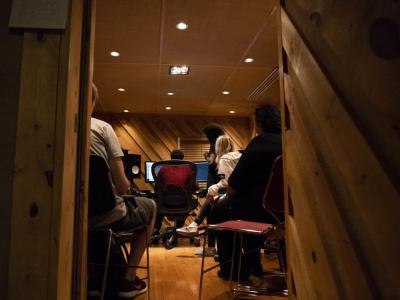What does a Songwriter-Producer do?
We live in a hyphenated world, and songwriter-producers—such as Ryan Tedder, Danger Mouse, Linda Perry, and Bruno Mars—are like one-stop shops for new tracks, blending the talents of a master songwriter and a top-shelf producer. Involved in every step of their songs' life cycle—from conception to revision to recording and production—songwriter-producers have unparalleled control over their product, enabling them to shape it with a broad and cohesive vision. Some songwriter-producers, like Max Martin and Greg Wells, work behind the scenes. Others, including the four mentioned above, are high-profile recording and performing artists who add their name and brand image to songs, in addition to their technical and creative prowess.
Songwriter-producers are hired for their ability to shepherd a song from a germ of an idea to a finished product.
Songwriter-producers may work occasionally as songwriters or producers on tracks where these roles are distinct. Most of the time, however, they are hired for their ability to shepherd a song from a germ of an idea to a finished product, produced and recorded. To do this, they employ a wide-ranging set of skills that includes programming beats and samples; playing instruments and singing; writing and revising melodies and lyrics; arranging songs; eliciting inspired performances from vocalists and musicians; and creating professional-level demos or master recordings. Songwriter-producers often develop sustained collaborative relationships with other recording artists and songwriters.
At a Glance
Some start out as songwriters, others as producers, but almost all are proficient performing musicians on at least one instrument. For songwriter-producers, finding success and moving up the ladder is all about making strong tracks, participating in numerous collaborations, and building an industry reputation. Songwriter-producers who have found respect in the industry have their pick of who to work with and what to work on.
As with many gigs in the entertainment industry, finding work as a songwriter-producer comes down to talent, hard work, connections, and luck—in roughly that order. Aspiring songwriter-producers are advised to cultivate their skills, collaborate frequently, and meet as many people in the industry as possible: artists, managers, producers, and label executives.
- Arranging
- Lyric writing
- Melody writing
- Production
- Critical listening
- Performance
- Instrumental proficiency
Songwriter-producers are often described as exceptionally hardworking. They have to be, in order to develop the large toolbox of skills required to do this work. However, just as importantly, songwriter-producers must be well-connected and collaborative. Whether it's writing as part of a team or inspiring strong performances from an artist, succeeding as a songwriter-producer sometimes comes down to basic people skills: communication and teamwork. In addition, rigorous, sustained networking is essential to landing jobs in this business.
The work life of a songwriter-producer is variable and unpredictable, with no set workplace, schedule, or infrastructure. All that matters is that the songwriter-producer complete the demo, which usually requires working alone, after hours, and on a deadline for publishers. Some songs are written and produced in a day, while others take a year or more to get right. In general, songwriter-producers spend more sustained effort and solo work on projects than top-line songwriters, who often do as many as three songs a day.
Most songwriter-producers work on a number of separate projects at the same time and fill free time (if they have any) by seeking out new collaborations, finishing demos or records, and performing side jobs like creating music libraries, producing game or sync music, and building sample packs.
Until they make it to the big leagues and start pulling in serious royalties, most songwriter-producers will need to find a supplemental source of income; fortunately, that income can be generated from the freelance activities noted above, by working as an assistant to a more successful producer, or by working as an engineer at a recording or publishing studio.








